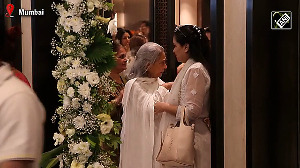The youth -- their dreams of government jobs unfulfilled -- are voicing their frustration.

Five years ago, the Bharatiya Janata Party's creditable performance across Uttar Pradesh and Prime Minister Narendra D Modi's emphatic victory margin at Varanasi concealed a series of nail-biting contests in nearly half a dozen seats in districts close to this Lok Sabha constituency.
Fast forward to the present, and the political landscape of UP's Purvanchal region is appearing relatively challenging for the BJP and its allies -- the Apna Dal and the Suheldev Bharatiya Samaj Party (SBSP).
The youth -- their dreams of government jobs unfulfilled -- are voicing their frustration.
Meanwhile, certain sections of the scheduled castes are viewing the Samajwadi Party-Congress alliance as a temporary refuge from the fading influence of the Bahujan Samaj Party.
All this, coupled with the close calls of 2019, is making the rank and file the BJP and its allies a bit nervous.
The National Democratic Alliance's roster of candidates in the vicinity of Varanasi is a formidable one, boasting two Union ministers -- the BJP's Mahendra Nath Pandey from Chandauli and the Apna Dal (Soneylal)'s Anupriya Patel from Mirzapur.
There are also a couple of political scions in the mix: The BJP's Neeraj Shekhar is contesting from Ballia, his father and former prime minister late Chandra Shekhar's traditional seat, and Arvind Rajbhar, SBSP chief and UP cabinet Minister Om Prakash Rajbhar's son, is in the fray at Ghosi.
Yet, the 2019 elections saw the BSP, then allied with the SP, clinch victories in Ghosi and Ghazipur, while the BJP and Apna Dal (Soneylal) -- except for Varanasi and Mirzapur -- had to settle for narrower wins in other constituencies.
For example, in Chandauli, Pandey won by 13,959 votes against the SP candidate. The BJP's then Ballia candidate, Virendra Singh, had won by 15,519 votes against the SP's Sanatan Pandey. The Apna Dal (Soneylal) won Robertsganj by 54,610 votes.

The SP's strategy of fielding candidates from a broad spectrum of castes, not just Yadavs, has sparked speculation of a potential shift in allegiance among smaller Other Backward Castes.
This is particularly evident in Robertsganj, a constituency reserved for scheduled castes, where the SP has fielded Chhotelal Kharwar, a BJP candidate in the 2014 polls.
From Mirzapur, the SP has fielded Ramesh Chand Bind, who was a BJP MP from the nearby Bhadohi in 2019. The BSP's Ghazipur MP Afzal Ansari is now the SP candidate.
"The narrative of this election has pivoted from nationalism to caste, with the Congress matching the BJP's outreach to the so-called 'labharthi varg'," says Aflatoon Desai, a Varanasi-based political worker associated with the Samajwadi Jan Parishad.
Desai has been canvassing for the INDIA bloc among the Dalits living in villages in Varanasi, Mirzapur, and nearby seats.
Yet, BJP spokesperson K K Sharma remains confident, citing the credibility of the prime minister's guarantees as a key factor in the party's favour.
"He (Modi) has delivered, while that (credibility of guarantees) of the Opposition is untested."
The question of how the SCs and OBCs will vote -- whether as beneficiaries of government welfare schemes, along caste lines, or as the "four pillars" of "youth, women, farmers and poor" -- remains open.
Public rallies in this region have seen Congress leader Rahul Gandhi pledge to fill three million government vacancies, provide free ration, and ensure farm loan waiver, while Modi has spoken of his humble beginnings, the Centre's Vishwakarma scheme for OBCs, and the Opposition's "designs to take away reservations".
On Tuesday, Rahul claimed GST was "ruinous" for weavers and toymakers in Varanasi, a day after BJP President J P Nadda addressed weavers of the constituency.
Conversations with the youth of Varanasi reveal a resonance with both narratives. Rohit Gupta, a young e-rickshaw owner, laments lack of government jobs and the dwindling Banarasi saree trade.
"The trade has shifted to Gujarat and elsewhere in the country. There were fewer orders and my commission from selling sarees had dwindled," Gupta says.
"I am a graduate. It is below my dignity to do this work (plying e-rickshaw). I blame the government for not filling government vacancies."
On the other hand, autorickshaw driver Suryakumar Keshri sees a future in self-employment, crediting improved infrastructure for increased tourist footfall.
"I am not looking for a job," says Keshri, who claims to have studied until higher secondary. He is "trusting" Modi's guarantees.
As the political drama unfolds, one thing is clear -- the labyrinthine bylanes of Varanasi hold no easy answers.
Aspirations, such as getting a government job, he points out perceptively, are linked with one's social and educational background.
Feature Presentation: Ashish Narsale/Rediff.com












 © 2025
© 2025